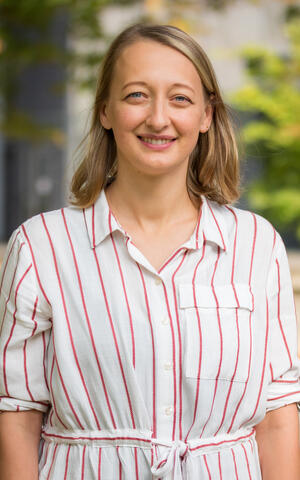Giving tumors no place to hide
“Right now I’m rediscovering all the different kinds of bread there are, after years of eating only toast,” says Dr. Lydia Dyck with a laugh. The cancer immunologist conducted research at Trinity College in Dublin for ten years. She grew up outside Bielefeld, though. Now she has returned to Germany, where in September 2021 she began a Marie Curie Postdoctoral Fellowship in Professor Thomas Blankenstein’s Molecular Immunology and Gene Therapy Lab at the Max Delbrück Center for Molecular Medicine in the Helmholtz Society (MDC).
Dyck’s goal in Berlin is to discover how certain immune cells, T cells, can recognize cancer cells and eliminate them. In healthy people, precisely this “clean up work” in the immune system protects against the emergence of a tumor. In people with cancer, however, the malignant growth hides from the immune system and can even suppress it.
How cancer manipulates the immune system
We can block the Tregs & thus release the brakes placed on the other T cells. The latter have been effective in fighting skin & colon cancer cells in experiment
Dyck studied the underlying mechanisms in her PhD thesis and in subsequent post-doctoral work. “Cancer cells even use certain immune cells – regulatory T cells, or “Tregs” for short – to keep other T cells away.” These Tregs accumulate in the cancerous tissue.
“But we can block the Tregs and thus release the brakes placed on the other T cells. The latter have been effective in fighting skin and colon cancer cells in experiments,” Dyck notes. This is the mechanism employed by the proven antibody nivolumab, which is currently used to treat various forms of cancer, especially advanced lung and skin cancer.
Excess body weight makes the immune system sluggish
Dyck emphasizes, however, that overall metabolism is decisive for the immune system’s ability to fight disease. In recent years she has studied the correlation between excess body weight and cancer. It is known that surplus pounds significantly increase the risk of many types of cancer. Dyck has discovered various mechanisms that explain why this is the case. “This new field of immunometabolism, which studies the interplay between immunology and metabolism, is extremely exciting,” she says.
Excess body weight suppresses the natural killer cells that ultimately neutralize cancer cells. “The T cells capable of fighting cancer are also less active. I’m going to submit this finding for publication soon.”
Pointing the immune system at tumors
Lydia Dyck
In the next two years, Dyck would like to increase our understanding of the effect metabolism has on the T-cell response to cancer, as well as of how T cells recognize cancer cells in the first place and attack them. “The Blankenstein Lab has a mouse model for that with humanized T cells. It’s perfect for studying these connections,” she says.
T cell-based cancer therapies are currently the subject of intense study around the world, now that remarkable success has been achieved with CAR T-cell therapies for otherwise incurable forms of leukemia and lymphoma. Two preparations based on genetically modified T cells that attack cancer cells have been approved in the EU since 2018. Blankenstein and his colleagues are developing T cell therapies that can be used against solid tumors.
Dyck is aware of operating in a highly relevant field of cancer research. “It would be great to make a contribution and discover something interesting that can be published in a good journal,” she says. Looking to the future, she adds, “I hope to find a more independent position in academic research after this fellowship.”
Text: Susanne Donner
Further information
- Press release: New cancer-fighting immunotherapy enters clinical trials
- Press release: Berlin start-up T-knife raises $110 million







